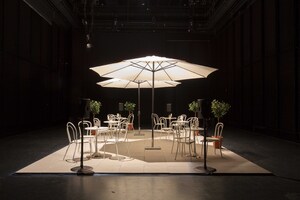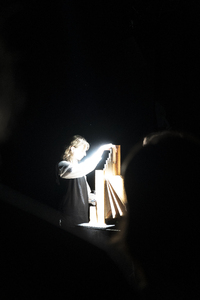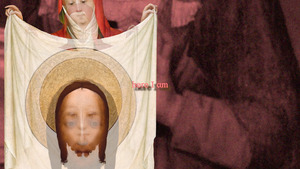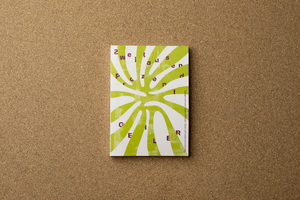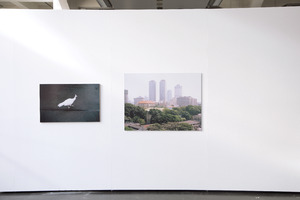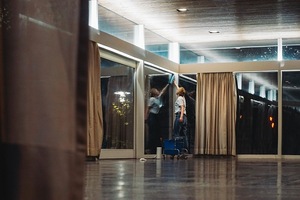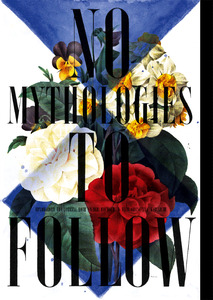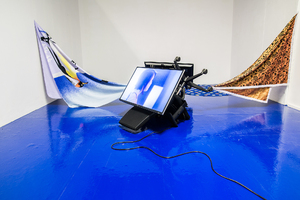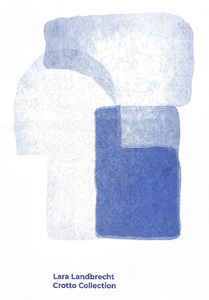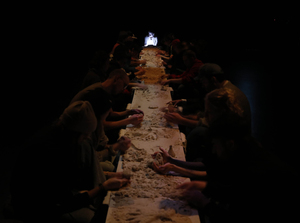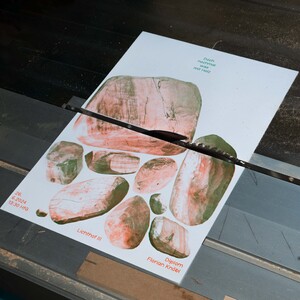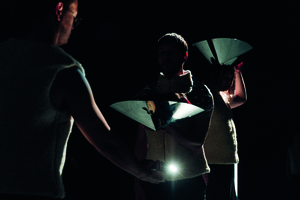Vordiplom Hannah Gebert
Benachbarte Sets (112)Alle Zusammenhänge anzeigen
Diese Sets wurden den gleichen Sets hinzugefügt wie das ausgewählte Set.
112 Inhalte
- Seite 1 von 10
Nichts, was uns passiert oder Genügend Anlass zur Erhebung der öffentlichen Klage
- Titel
- Nichts, was uns passiert oder Genügend Anlass zur Erhebung der öffentlichen Klage
- Titel (en)
- Nothing that happens to us or Sufficient reason to file a public complaint
- Untertitel
- Hörstück und (Körper-) Übung eines Dialogs
- Untertitel des Projekts/Werks (en)
- Audio piece and (physical) exercise of a dialog
- Autor/in
- Beschreibung (de)
- Die Arbeit „Nichts, was uns passiert“ oder „Genügend Anlass zur Erhebung der öffentlichen Klage“ thematisiert den Umgang mit sexueller Gewalt in unserer Gesellschaft. Sie fragt, wie und vor allem ob wir durch unsere Sozialisierung gelernt haben, über sexuelle Gewalt zu sprechen. Sie fragt nach dem Vermögen, uns diese Art von Gewalt in unserem eigenen Umfeld (Familie, Freundeskreis, Arbeitsgemeinschaft, u.a.) vorzustellen und danach, warum Erzählungen über sexuelle Gewalt meist in der Ferne, im Abstrakten verortet werden.
- Beschreibung (en)
- The work "Nichts, was uns passiert" (Nothing that happens to us) or "Genügend Anlass zur Erhebung der öffentlichen Klage" (Sufficient reason to file a public complaint) addresses how we deal with sexual violence in our society. It asks how and, above all, whether we have learned to talk about sexual violence through our socialization. It asks about our ability to imagine this kind of violence in our own environment (family, circle of friends, work community, etc.) and why stories about sexual violence are usually located in the distance, in the abstract.
- Kategorie
- Schlagworte
- Mitwirkende
- Titel
- Nichts, was uns passiert oder Genügend Anlass zur Erhebung der öffentlichen Klage
- Projektleiter/in
- Semester
- Studiengang
- Typ der Abschlussarbeit
- Importiert am
- 24.06.2024
- Übergeordnete Sets
- 2
- Set enthält
- 0 4
sentimental gentle rental
- Titel
- sentimental gentle rental
- Untertitel
- performance for a portative organ
- Autor/in
- Beschreibung (de)
- "sentimental gentle rental”, das Abschlussprojekt von Juliane Schmitt, ist eine Performance- und Soundinstallation, die sich um die Portativorgel dreht, ein Instrument, das im Mittelalter populär war. Die Arbeit basiert auf der Recherche über Nonnen in mittelalterlichen Klöstern. Die Portativorgel prägt die Aufführung durch ihren atemähnlichen Rhythmus. Die begrenzte Tonreichweite wird durch die Verwendung von Tools erweitert, um die Pfeifenlängen zu verändern. Dabei entsteht Reibung durch Obertöne, Dissonanzen und schwingende Frequenzen. Die Performerinnen synchronisieren ihren Atem mit dem Instrument und schaffen so ein zartes Gleichgewicht von Klang und Stille. Die Portativorgel, geliehen von einem Orgelbauer, wird damit zu einem Stellvertreterobjekt zarter Sentimentalität und zeitlich begrenzter Transzendenz.
- "sentimental gentle rental”, das Abschlussprojekt von Juliane Schmitt, ist eine Performance- und Soundinstallation, die sich um die Portativorgel dreht, ein Instrument, das im Mittelalter populär war. Die Arbeit basiert auf der Recherche über Nonnen in mittelalterlichen Klöstern. Die Portativorgel prägt die Aufführung durch ihren atemähnlichen Rhythmus. Die begrenzte Tonreichweite wird durch die Verwendung von Tools erweitert, um die Pfeifenlängen zu verändern. Dabei entsteht Reibung durch Obertöne, Dissonanzen und schwingende Frequenzen. Die Performerinnen synchronisieren ihren Atem mit dem Instrument und schaffen so ein zartes Gleichgewicht von Klang und Stille. Die Portativorgel, geliehen von einem Orgelbauer, wird damit zu einem Stellvertreterobjekt zarter Sentimentalität und zeitlich begrenzter Transzendenz.
- Beschreibung (en)
- "sentimental gentle rental” the graduation project by Juliane Schmitt is a performance and sound installation centered on the portative organ, an instrument that was popular in medieval times.
The work is based on research on nuns in medieval monasteries. The portative organ shapes the performance through its rhythmic breath-like cadence. The limited tonal range is expanded by using tools to adjust pipe lengths, producing higher tones and creating friction with overtones, dissonances, and oscillating frequencies. The performers synchronize their breath with the instrument, creating a delicate balance of sound and silence, transforming the organ that was borrowed from an organ builder into a vessel of gentle sentimentality and temporal transcendence.
- "sentimental gentle rental” the graduation project by Juliane Schmitt is a performance and sound installation centered on the portative organ, an instrument that was popular in medieval times.
- Kategorie
- Typ des Projekts/Werks
- Schlagworte
- Datierung
- 23.02.2024
- Mitwirkende
- Dank an
- Jonathan Blaschke
- Julius Bläser
- Pauline Cemeris
- Tamara Goerhinger
- Jana Hofmann
- Matthias Holznagel
- Line-Gry Hørup
- Bruno Jacoby
- Rafael Jörger
- Alexander Knoppik
- Vincent Krüger
- Mona Mayer
- Isabel Motz
- Nina Overkott
- Nis Petersen
- Tereza Ruller
- Sebastian Schäfer
- Josefine Scheu
- Isabel Seiffert
- Saskia van der Meer
- Mathis Walter
- Leia Morgana Walz
- Sprache
- Material
- Dauer
- 8 min – theoretically infinite
- Ort: Institution
- Ort
- Großes Studio
- Stadt
- Land
- Internetlinks
- Titel
- sentimental gentle rental
- Projektleiter/in
- Semester
- Studiengang
- Typ der Abschlussarbeit
- Importiert am
- 24.06.2024
- Übergeordnete Sets
- 2
- Set enthält
- 0 9
I used to think that I was made of Stone
- Titel
- I used to think that I was made of Stone
- Titel (en)
- I used to think that I was made of Stone
- Autor/in
- Beschreibung (de)
- In der multimedialen Installation „I used to think that I was made of Stone“ werden die Besuchenden Zeug*innen eines nächtlichen Treffens von vier Personen, die nur durch ihre Stimmen präsent sind. Sie unterhalten sich über merkwürdige Objekte in ihrer greifbaren Nähe, führen nebensächliche Gespräche und verbringen einen Abend damit, Musik zu hören und zu tanzen. Ihre Körper bleiben in der Installation unsichtbar, die Objekte im Raum werden zu Spuren.
Durch das Sammeln, neu Arrangieren und Kombinieren von religiösen, (pop-)kulturellen und selbst produzierten Fragmenten im Raum verhandelt „I used to think that I was made of Stone”, wie Lücken und Ausschmückungen unsere Realitäten in der Gegenwart formen und welche Geschichten und Nacherzählungen sie produzieren. Dabei fragt es nach Autor*innenschaft und den Übersetzer*innen, die das Produzierte wortwörtlich über-setzen, weiter-tragen und fort-spinnen und somit stetig weiter produzieren. Sie bestimmen die Stofflichkeit der Geschichte, knoten die Fäden der Ausschmückungen, brennen Löcher und Lücken in das Gewebe und geben es weiter.
- In der multimedialen Installation „I used to think that I was made of Stone“ werden die Besuchenden Zeug*innen eines nächtlichen Treffens von vier Personen, die nur durch ihre Stimmen präsent sind. Sie unterhalten sich über merkwürdige Objekte in ihrer greifbaren Nähe, führen nebensächliche Gespräche und verbringen einen Abend damit, Musik zu hören und zu tanzen. Ihre Körper bleiben in der Installation unsichtbar, die Objekte im Raum werden zu Spuren.
- Beschreibung (en)
- In the multimedia installation “I used to think that I was made of Stone”, visitors witness a nighttime meeting of four people who are only present through their voices. They talk about strange objects within reach, have trivial conversations, and spend an evening listening to music and dancing. Their bodies remain invisible in the installation, while the objects in the room become traces of their presence.
By collecting, rearranging and combining religious, (pop) cultural and self-produced fragments in the space, “I used to think that I was made of Stone” explores how gaps and embellishments shape our realities in the present, and what stories they generate or retell. In doing so, it questions authorship and the role of translators, who literally translate, carry forward, and elaborate on what has already been produced, thus continuing the production process. They determine the material nature of the story, tie the threads of embellishment, burn holes and gaps into the fabric and pass it on.
- In the multimedia installation “I used to think that I was made of Stone”, visitors witness a nighttime meeting of four people who are only present through their voices. They talk about strange objects within reach, have trivial conversations, and spend an evening listening to music and dancing. Their bodies remain invisible in the installation, while the objects in the room become traces of their presence.
- Kategorie
- Typ des Projekts/Werks
- Schlagworte
- Datierung
- Februar 2023
- Mitwirkende
- Sprache
- Abmessungen
- „face imprint” (Textil, Wachs, 63 x 54 cm); „about veronica” (Textil, Stickerei, 84 x 67 cm); „about the cloth” (Projektion, 12 Seiten); „I used to think” (HD-video, Audio, 13:46 min); „toad” (Ton, Wachs, 11 x 13 cm); „wax and stones” (Wachs, Schwelle TV HIFI, 20 x 6 cm); „wax and stone” (Wachs, Stein, 40 x 40 x 10 cm); „everyone” (Reader, 9,5 x 15,2 cm, 36 Seiten); „glasses” (4 Kristallgläser, 5 x 7 cm, Wachs); „jumping rope” (Seil, 2 m); „gestalt mit großem hut” (Keramik, 6 x 7 cm); „fabric n°1” (Textil, Wachs, 57 x 41cm); „fabric n°2” (Textil, Wachs, 60 x 45 cm); „y” (Textil, Wachs, 25 x 15 cm); „woven temple, hidden cocoon #3” (Playlist, 43 Tracks); „wine fountain” (Glas, Pumpe, Wein, 20 x 20 x 110 cm); „cushion” (Textil, Watte, Stickerei, 15 x 15 cm)
- Ort: Institution
- Stadt
- Land
- Titel
- I used to think that I was made of Stone
- Projektleiter/in
- Semester
- Studiengang
- Typ der Abschlussarbeit
- Importiert am
- 25.06.2024
- Übergeordnete Sets
- 2
- Set enthält
- 0 14
Zweitausend Prozent GEILER
- Titel
- Zweitausend Prozent GEILER
- Titel (en)
- two thousand percent nicer
- Untertitel
- Über kreative Arbeit und Familie
- Untertitel des Projekts/Werks (en)
- About creative work and family
- Autor/in
- Beschreibung (de)
- "Zweitausend Prozent GEILER – Über kreative Arbeit und Familie" setzt sich mit dem Thema Mutterschaft auseinander. Hierbei liegt der Fokus vor allem auf arbeitenden Müttern in der Kreativbranche. Mutterschaft ist in Arbeitskontexten oftmals mit negativen Vorurteilen behaftet, denen sich dieses Buch stellt, indem es die guten Aspekte von Mutterschaft und ihren Wert für Arbeitswelt und Gesellschaft thematisiert. In Interviews kommen 14 Mütter und ein Vater zu Wort, die ihre Erfahrungen und Perspektiven teilen. Umrahmt werden die Interviewaussagen von Illustrationen und einem Essay der Designjournalistin Zosia Swidlicka aus London. In einem Glossar können die herausgearbeiteten Aspekte nachgeschlagen werden.
- Beschreibung (en)
- “Zweitausend Prozent GEILER - Über kreative Arbeit und Familie” deals with the topic of motherhood. The focus here is primarily on working mothers in the creative industry. Motherhood is often associated with negative prejudices in work contexts, which this book confronts by addressing the good aspects of motherhood and its value for the world of work and society. In interviews, 14 mothers and one father share their experiences and perspectives. The interview statements are framed by illustrations and an essay by design journalist Zosia Swidlicka from London. A glossary provides information on the aspects discussed.
- Kategorie
- Typ des Projekts/Werks
- Schlagworte
- Datierung
- Juli 2024
- Mitwirkende
- Sprache
- Abmessungen
- 13,5cm x 19cm x 1,3cm (BHT)
- Ort: Institution
- Stadt
- Land
- Titel
- Zweitausend Prozent GEILER
- Projektleiter/in
- Semester
- Studiengang
- Typ der Abschlussarbeit
- Importiert am
- 22.07.2024
- Übergeordnete Sets
- 3
- Set enthält
- 0 21
Ich hatte vom feeling her ein gutes Gefühl
- Titel
- Ich hatte vom feeling her ein gutes Gefühl
- Autor/in
- Beschreibung (de)
- „Der Weg ist das Ziel“ ist meine Devise. Der Arbeitsprozess ist daher ein wichtiger Teil meines Diploms. Ich zeige Fotos aus unterschiedlichen Teilen der Welt mit sehr unterschiedlichen Bildsprachen. Sie sind Momentaufnahmen aus meinem Blick durch die Kamera. Diese Bilder setze ich in Bezug zueinander, wobei manche Bilder miteinander harmonieren, funktionieren, kommunizieren – andere wiederum nicht. Durch die projizierten Bilder ändern sich die Bezüge und zeigen, dass die Bilder anders kommunizieren, je nachdem, welche Bilder an ihrer Seite sind. Dabei ist die Abfolge der Bilder eine Endlosschleife, und eine Bildkombination einer Wand kehrt immer wieder. Die Betrachtenden sind frei, selbst zu assoziieren, und jeder Blick sieht einen neuen, ganz eigenen Zusammenhang in der Konstellation der Fotografien.
Fotografieausstellung mit 18 Bildern auf Holz und Aludibond und 30 Bildern projiziert auf zwei Beamern.
- „Der Weg ist das Ziel“ ist meine Devise. Der Arbeitsprozess ist daher ein wichtiger Teil meines Diploms. Ich zeige Fotos aus unterschiedlichen Teilen der Welt mit sehr unterschiedlichen Bildsprachen. Sie sind Momentaufnahmen aus meinem Blick durch die Kamera. Diese Bilder setze ich in Bezug zueinander, wobei manche Bilder miteinander harmonieren, funktionieren, kommunizieren – andere wiederum nicht. Durch die projizierten Bilder ändern sich die Bezüge und zeigen, dass die Bilder anders kommunizieren, je nachdem, welche Bilder an ihrer Seite sind. Dabei ist die Abfolge der Bilder eine Endlosschleife, und eine Bildkombination einer Wand kehrt immer wieder. Die Betrachtenden sind frei, selbst zu assoziieren, und jeder Blick sieht einen neuen, ganz eigenen Zusammenhang in der Konstellation der Fotografien.
- Beschreibung (en)
- “The journey is the reward” is my motto. The work process is therefore an important part of my diploma. I show photos from different parts of the world with very different visual languages. They are snapshots from my view through the camera. I place these images in relation to each other, whereby some images harmonize, function and communicate with each other - others do not. The projected images change the references and show that the images communicate differently depending on which images are at their side. The sequence of images is an endless loop and a combination of images on a wall is repeated again and again. Viewers are free to make their own associations and each view sees a new, unique context in the constellation of photographs.
Photography exhibition with 18 pictures on wood and Aludibond and 30 pictures projected on two beamers.
- “The journey is the reward” is my motto. The work process is therefore an important part of my diploma. I show photos from different parts of the world with very different visual languages. They are snapshots from my view through the camera. I place these images in relation to each other, whereby some images harmonize, function and communicate with each other - others do not. The projected images change the references and show that the images communicate differently depending on which images are at their side. The sequence of images is an endless loop and a combination of images on a wall is repeated again and again. Viewers are free to make their own associations and each view sees a new, unique context in the constellation of photographs.
- Kategorie
- Material
- Titel
- Ich hatte vom feeling her ein gutes Gefühl
- Projektleiter/in
- Semester
- Studiengang
- Typ der Abschlussarbeit
- Importiert am
- 30.07.2024
- Übergeordnete Sets
- 2
- Set enthält
- 0 12
Prolog 1 (Pavillon)
- Titel
- Prolog 1 (Pavillon)
- Titel (en)
- Prolog 1 (Pavilion)
- Autor/in
- Beschreibung (de)
- Die Arbeit Prolog 1 (Pavillon) begann mit einem künstlerischen Interesse an den raumvermessenden, kartographierenden Aspekten des Putzens – als Prinzip der Aneignung – sowie seiner skulpturalen Qualität.
Die Arbeit, die am 23. Oktober 2018 von 17-20 Uhr in einem rundumverglasten Pavillon der 1960er Jahre Moderne, an der Brauer-, Ecke Gartenstraße in Karlsruhe stattfand, bestand auf Handlungsebene aus dem Putzen des Inneren des Pavillons. Über vier an den Ecken des Pavillons angebrachte Lautsprecher hörten die sich im umliegenden Park befindenden Besucher*innen Textfragmente über den Pavillon: seine räumliche Verortung, seine (Un)-Zugänglichkeit auf institutioneller und baulicher Ebene sowie seine Architektur – Akten, Erzählungen, Spekulationen. Über drei Stunden Laufzeit verdichteten sich diese immer auch durch die Folie des Putzaktes ausgesuchten, verfassten und montierten Textfragmente zu einer offenen Erzählung.
Aus einer ursprünglich intuitiven Affinität zu diesem Ort sollte die Arbeit über das Putzen in genau diesem Pavillon stattfinden – Architektur der Nachkriegsmoderne, ein Kantinengebäude, angeblich von Egon Eiermann erbaut. Ein Gebäude, das der vielbefahrenen Straßenkreuzung den Rücken zudreht, eigentlich prominent platziert ist, aber von den meisten Passierenden unentdeckt bleibt – ein Ort, der auf vielen Ebenen changiert zwischen Sichtbarkeit, Unzugänglichkeit, Intransparenz und Mysterium.
Erst durch den langen Prozess, überhaupt Zugang zu dem ungenutzten Hochparterre des Gebäudes zu erhalten, und die damit einhergehenden intensiven Nachforschungen, verschob sich der Fokus der Arbeit hin zum Gebäude selbst und seiner schwer zu durchdringenden, sich nie ganz ergründenden Geschichte. Der Versuch, das Gebäude als Ausstellungsort zu nutzen, wurde in diesem Prozess Teil der Arbeit selbst.
So fanden diese unterschiedlichen Formen der Aneignung, das Putzen und die Recherche, letztlich wieder zusammen, am 23. Oktober 2018: einen Tag im Leben des Pavillons markierend, an dem alle Anwesenden zu Zeitzeug*innen seiner Existenz wurden. Die Besucher*innen befanden sich – die Textfragmente hörend – draußen im Park, während Judith Milz sich zeitgleich – als einzige Person – im Inneren des Pavillons befand, ihn drei Stunden lang putzte, während es draußen erst dämmerte und dann dunkel wurde, bis schließlich, Lichter aus, Tür zu, der Pavillon geputzt, der Abend vorbei war.
- Die Arbeit Prolog 1 (Pavillon) begann mit einem künstlerischen Interesse an den raumvermessenden, kartographierenden Aspekten des Putzens – als Prinzip der Aneignung – sowie seiner skulpturalen Qualität.
- Beschreibung (en)
- Prolog 1 (Pavilion) began with an artistic interest in the spatial and cartographic aspects of cleaning—as a principle of appropriation—as well as its sculptural quality.
The work, which took place on October 23, 2018, from 5 to 8 p.m., in a glass-walled pavilion from the modernist 1960s located at the corner of Brauerstraße and Gartenstraße in Karlsruhe, consisted, on the level of action, of cleaning the interior of the pavilion. Through four speakers mounted at the corners of the structure, visitors in the surrounding park could hear fragments of text about the pavilion: its spatial positioning, its (in)accessibility on both institutional and architectural levels, and its architecture—documents, narratives, speculations. Over the course of three hours, these curated, composed, and edited text fragments—always filtered through the act of cleaning—accumulated into an open-ended narrative.
The initial impulse to realize this work in exactly this pavilion arose from an intuitive affinity with the site—post-war modernist architecture, a former cafeteria building, allegedly designed by Egon Eiermann. A structure that turns its back on a busy intersection, prominently situated yet largely unnoticed by passersby—a place that wavers on many levels between visibility, inaccessibility, opacity, and mystery.
Only through the prolonged process of gaining access to the building’s unused raised ground floor—and the intensive research that this required—did the focus of the work begin to shift toward the building itself and its elusive, never fully graspable history. The attempt to use the building as an exhibition site ultimately became part of the work itself.
Thus, these different forms of appropriation—cleaning and research—converged once more on October 23, 2018: marking a day in the life of the pavilion on which all those present became witnesses to its existence. While the audience stood outside in the park listening to the audio fragments, Judith Milz—alone inside the pavilion—cleaned the space for three hours, as dusk settled and darkness fell, until finally, with the lights turned off and the door closed, the pavilion was cleaned, and the evening was over.
- Prolog 1 (Pavilion) began with an artistic interest in the spatial and cartographic aspects of cleaning—as a principle of appropriation—as well as its sculptural quality.
- Kategorie
- Typ des Projekts/Werks
- Schlagworte
- Datierung
- 23.10.2018
- Mitwirkende
- Sprache
- Material
- Dauer
- 3 Stunden
- Ort
- Pavillion, Brauer- Ecke Gartenstraße Karlsruhe
- Stadt
- Land
- Beteiligte Institution(en)
- Internetlinks
- Bemerkungen
- In den Archivierungsdokumenten finden Sie einen Text über die Entstehung der Arbeit. In der Online Fassung des PDFs sind zwei Informationen geschwärzt, die aber in der Hochschule für Gestaltung Karlsruhe vor Ort – bei Interesse – eingesehen werden können. Wenden Sie sich hierzu bitte an das Archiv der HfG Karlsruhe. Außerdem können Sie versuchen mich unter folgender Emailadresse zu erreichen: judith.friederike.milz@gmail.com
- Titel
- Prolog 1 (Pavillon)
- Projektleiter/in
- Semester
- Studiengang
- Typ der Abschlussarbeit
- Importiert am
- 30.07.2024
- Übergeordnete Sets
- 2
- Set enthält
- 0 14
No Mythologies To Follow
- Titel
- No Mythologies To Follow
- Autor/in
- Beschreibung (de)
- "No Mythologies To Follow" zeigt Blumenarrangements für die neun Kulturgüter der Stadt Karlsruhe, die unter Schutz der Haager Konvention stehen.
Die Konvention ist ein völkerrechtlicher Vertrag, der auf Grund der Erfahrungen vorangegangener Weltkriege durch die UNESCO (United Nations Educational, Scientific and Cultural Organization) im Jahr 1954 ins Leben gerufen wurde. Sie stellt (un)bewegliche
Kulturgüter im bewaffneten Konfliktfall unter Schutz. Das heißt, die gelisteten Gebäude dürfen im Kriegsfall von Mitgliedsstaaten nicht geplündert oder attackiert werden, da „jede Schädigung von Kulturgut, gleichgültig welchem Volke es gehört, eine Schädigung des kulturellen Erbes der ganzen Menschheit bedeutet.“ Die Auswahlkriterien für schützenswertes Kulturgut sind dabei nicht immer klar nachzuvollziehen und zeigen, dass Kultur und ihre Bewertung stets an die jeweilige Gesellschaft und ihr Zeitverständnis gebunden ist. Nach der Haager Konvention gibt es Kulturgüter deren „Erhaltung (…) für alle Völker der Welt von großer Bedeutung ist.“
Die Blumenarrangements werden in der Ausstellung zu Akteuren, die für einen anderen Umgang mit Kulturgut stehen. Durch sie wird Vergänglichkeit artikuliert.
Zitate aus: Konvention zum Schutz von Kulturgut bei bewaffneten Konflikten – Haager Konvention vom 14. Mai 1954.
- "No Mythologies To Follow" zeigt Blumenarrangements für die neun Kulturgüter der Stadt Karlsruhe, die unter Schutz der Haager Konvention stehen.
- Beschreibung (en)
- “No Mythologies To Follow” shows flower arrangements for the nine cultural assets of the city of Karlsruhe that are protected by the Hague Convention.
The Convention is a treaty under international law that was brought into being by UNESCO (United Nations Educational, Scientific and Cultural Organization) in 1954 as a result of the experiences of previous world wars. It provides (in)movable
cultural property under protection in the event of armed conflict. This means that the listed buildings may not be looted or attacked by member states in the event of war, as “any damage to cultural property, regardless of the people to whom it belongs, means damage to the cultural heritage of all mankind.” The selection criteria for cultural property worthy of protection are not always clear and show that culture and its evaluation are always linked to the respective society and its understanding of the times.
is bound to the respective society and its understanding of time. According to the Hague Convention, there are cultural assets whose “preservation (...) is of great importance to all peoples of the world.”
In the exhibition, the flower arrangements become actors that stand for a different approach to cultural assets. They articulate transience.
Quotes from: Convention for the Protection of Cultural Property in the Event of Armed Conflict - Hague Convention of May 14, 1954.
- “No Mythologies To Follow” shows flower arrangements for the nine cultural assets of the city of Karlsruhe that are protected by the Hague Convention.
- Kategorie
- Typ des Projekts/Werks
- Schlagworte
- Mitwirkende
- Dank an
- Harald Bogdan
- Michael Clegg
- Anja Dorn
- Pham Minh Duc
- Friedemann Dupelius
- Lotte Effinger
- Susan Funk
- Hasan Halilovic
- Korbinian Herlein
- Erika Hoth
- Katharina Hoth
- Burkhard Hoth
- Achim Kaltwasser
- Wilfried Kuehn
- Barbara Kuon
- Gisbert Laaber
- Armin Linke
- Henrike Mall
- Isabel Mehl
- Nicolas Rauch
- Gerald Reinhardt
- Christiane Riedel
- Thomas Rustemeyer
- Martina Stern
- Felicitas Wetzel
- Tobias Wootton
- Emre Yilmaz
- Ort: Institution
- Ort
- Ausstellungsraum EG
- Stadt
- Beteiligte Institution(en)
- Titel
- No Mythologies To Follow
- Semester
- Studiengang
- Typ der Abschlussarbeit
- Importiert am
- 30.07.2024
- Übergeordnete Sets
- 2
- Set enthält
- 6 6
Oberfläche schwarz/blau/grün
- Titel
- Oberfläche schwarz/blau/grün
- Titel (en)
- Surface Black/Blue/Green
- Autor/in
- Beschreibung (de)
- Bei der 2-Kanal-Videoinstallation „Oberfläche schwarz/blau/grün“ zum Thema Migration werden zwei Situationen betrachtet und einander gegenübergestellt: Migration von einem Land in ein anderes und Migration auf einen anderen Planeten.
- Beschreibung (en)
- The two-channel video installation is about migration, in which two situations are considered and contrasted: migration from one country to another and migration to another planet.
- Kategorie
- Schlagworte
- Titel
- Oberfläche schwarz/blau/grün
- Projektleiter/in
- Semester
- Studiengang
- Typ der Abschlussarbeit
- Importiert am
- 01.08.2024
- Übergeordnete Sets
- 2
- Set enthält
- 1 10
Crotto Collection
- Titel
- Crotto Collection
- Untertitel des Projekts/Werks (en)
- Translation of sanitary ceramics
- Autor/in
- Beschreibung (de)
- Das Projekt „Crotto Collection“ untersucht den Raum des Badezimmers von der funktionalen Nasszelle bis zum häuslichen Refugium. Trotz ihrer Vielfalt teilen Baderäume ein zentrales, funktionales Element: die Sanitärkeramik.
Das Projekt beschäftigt sich mit den Gestaltungsmöglichkeiten durch die Übersetzung gebrannter Sanitärkeramik in ein neues Material. In Zusammenarbeit mit der Firma Geberit GmbH wird die Zusammensetzung des Materialentwurfs untersucht, auf ihre Eigenschaften geprüft und ein Gestaltungskonzept für Badezimmeraccessoires entwickelt. Basierend auf den Forschungsergebnissen wird ein Konzept entwickelt, das als Ansatz dient, keramische Abfälle innerhalb der Produktionskette einer Industrie weiter zu verwerten. Parallel zu verschiedenen Fliesenformen wird ein Zubehörset bestehend aus Spiegelhalter, Becher und Seifenschale entworfen. Darüber hinaus werden Vasen aus Toilettenformen entwickelt, als Symbol für die Ausweitung des Badezimmers in andere Wohnräume.
- Das Projekt „Crotto Collection“ untersucht den Raum des Badezimmers von der funktionalen Nasszelle bis zum häuslichen Refugium. Trotz ihrer Vielfalt teilen Baderäume ein zentrales, funktionales Element: die Sanitärkeramik.
- Beschreibung (en)
- The project “Crotto Collection” examines the bathroom space from the functional wet room to the domestic refuge. Despite their variety, bathrooms all serve a common purpose. The central component of any bathroom is the sanitary ceramics.
This fact gives rise to the project, which deals with the design possibilities of translating fired sanitary ceramics into a new material. In collaboration with Geberit GmbH, material properties and usability are being investigated. Based on the research results, a design concept is developed that serves as an approach to translate ceramic waste within the production chain of an industry. Parallel to different shapes of tiles, an accessory set consisting of a mirror holder, a tumbler and a soap dish is created. In addition, vases are designed from toilet forms, as a symbol of extending the bathroom space into other living spaces.
- The project “Crotto Collection” examines the bathroom space from the functional wet room to the domestic refuge. Despite their variety, bathrooms all serve a common purpose. The central component of any bathroom is the sanitary ceramics.
- Kategorie
- Typ des Projekts/Werks
- Schlagworte
- Datierung
- 24.04.2024
- Material
- Abmessungen
- Die Objekte sind als Set zu sehen: 1 Set beinhaltet drei Teile: Maße Set gesamt: 200mm x 200mm x 100mm. Es sind 5 Sets in jeweils einer Farbe – 5 Vasenobjekte: Maße 1 Vase: 150mm x 180mm x 300mm – Materialfliesen: 20 Stück à 40mm x 100mm x 5mm – Farbfliesen: 30 Stück à 100mm x 100mm x 8mm – Gipsformen: 8 Stück
- Ort: Institution
- Ort
- Lichthof 1
- Stadt
- Land
- Beteiligte Institution(en)
- Titel
- Crotto Collection
- Projektleiter/in
- Semester
- Studiengang
- Typ der Abschlussarbeit
- Archiv-Signatur
- Externes Archiv
- Importiert am
- 08.08.2024
- Übergeordnete Sets
- 3
- Set enthält
- 0 22
Etwas Aufnehmen
- Titel
- Etwas Aufnehmen
- Titel (en)
- Get in touch with
- Untertitel
- Eine Reading Performance in 4 Teilen
- Untertitel des Projekts/Werks (en)
- A reading performance in 4 chapters
- Autor/in
- Beschreibung (de)
- "Etwas Aufnehmen" ist eine 30-minütige interaktive Reading Performance über den (Tast-) Sinn. Sie findet an einem 15 m langen Steintisch statt, 80 kg kinetischer Sand liegen auf ihm verteilt. Die Performance entstand in sechsmonatiger Recherche und im Austausch mit einer blinden Künstlerin, einem Tastforscher, einem Übersetzer von visuellen Lernmaterialien und einer Tierkommunikationsexpertin und erzählt außerdem von einer Kollaboration mit einem Hund (Betty). Welchen Stellenwert nimmt der Tastsinn in unserer Wahrnehmung ein, um Dinge wortwörtlich zu "begreifen"? Wie kommuniziere oder gestalte ich mit einem Tier, welches auf ganz andere Sinne zurückgreifen kann? "Etwas Aufnehmen" hinterfragt die eigene Wahrnehmung und beschreibt den Drang nach Verständigung. Die Reading Performance ist sowohl taktil, auditiv als auch visuell wahrnehmbar.
- Beschreibung (en)
- "Get in touch with" is a 30-minute interactive reading performance about the (tactile) sense. It takes place on a 15 metre long stone table with 80 kg of kinetic sand on top. The performance is the result of a six-month research and exchange with a blind artist, a tactile researcher, a translator of visual learning materials and an animal communication expert, and also tells of a collaboration with a dog (Betty). What role does the sense of touch play in our perception? How do I communicate or design with an animal that has access to completely different senses? "Etwas Aufnehmen" questions our own perception and describes the urge for understanding. The reading performance can be experienced tactilely, acoustically and visually.
- Kategorie
- Typ des Projekts/Werks
- Schlagworte
- Datierung
- Februar 2023
- Mitwirkende
- Dank an
- Sprache
- Untertitel (Film)
- Material
- Abmessungen
- Länge: 15m, Breite: 25cm, Höhe: 25cm
- Dauer
- 30min
- Ort: Institution
- Ort
- Großes Studio
- Stadt
- Land
- Internetlinks
- Titel
- Etwas Aufnehmen
- Projektleiter/in
- Semester
- Studiengang
- Typ der Abschlussarbeit
- Importiert am
- 05.10.2024
- Übergeordnete Sets
- 2
- Set enthält
- 0 16
Doch nochmal was mit Holz
- Titel
- Doch nochmal was mit Holz
- Autor/in
- Beschreibung (de)
- In meinem Diplom „Doch nochmal was mit Holz“ werden ausschließlich Holzreste von abgestorbenen Bäumen und solchen, die industriell keine Verwendung bekommen können transformiert. Äste werden jetzt zu ziegelartigen Holzsteinen, andere Teile des Baumes zu Natursteinen oder Geröll.
Ergänzt wird diese Holzwelt durch übergroße Nägel aus hochgebranntem Ton, die geschmiedete Metallnägel, verrostet und neu, nachahmen.
- In meinem Diplom „Doch nochmal was mit Holz“ werden ausschließlich Holzreste von abgestorbenen Bäumen und solchen, die industriell keine Verwendung bekommen können transformiert. Äste werden jetzt zu ziegelartigen Holzsteinen, andere Teile des Baumes zu Natursteinen oder Geröll.
- Beschreibung (en)
- In my diploma “Doch nochmal was mit Holz”, only wood residues from dead trees and those that cannot be used industrially are transformed. Branches now become brick-like wooden stones, other parts of the tree become natural stones or boulders.
This world of wood is complemented by oversized nails made of high-fired clay that imitate forged metal nails, rusted and new.
- In my diploma “Doch nochmal was mit Holz”, only wood residues from dead trees and those that cannot be used industrially are transformed. Branches now become brick-like wooden stones, other parts of the tree become natural stones or boulders.
- Kategorie
- Schlagworte
- Dank an
- Material
- Ort: Institution
- Ort
- Lichthof 3
- Stadt
- Land
- Beteiligte Institution(en)
- Titel
- Doch nochmal was mit Holz
- Projektleiter/in
- Semester
- Studiengang
- Typ der Abschlussarbeit
- Importiert am
- 06.10.2024
- Übergeordnete Sets
- 3
- Set enthält
- 0 14
Reflecting Bodies
- Titel
- Reflecting Bodies
- Titel (en)
- Reflecting Bodies
- Untertitel
- A space where a physical phenomenon meets a personal fascination
- Untertitel des Projekts/Werks (en)
- A space where a physical phenomenon meets a personal fascination
- Autor/in
- Beschreibung (de)
- „Reflektierende Körper“ ist eine interaktive Installation, bei der das physikalische Phänomen der Lichtreflexionen auf eine persönliche Faszination für diese trifft. Im Fokus stehen Lichtreflexionen, die vom menschlichen Körper ausgehen und in Verbindung mit dessen Bewegungsabläufen entstehen.
Hauptbestandteil der Installation ist eine Serie von vier Metallobjekten, die wie Schmuckstücke am Körper getragen werden und mit Wasser gefüllt sind. Sie dienen als Reflexionsflächen und geben auf subtile Art und Weise die Präsenz der Menschen im Raum wieder, während sich dieser in eine lebendige und dynamische Lichtinstallation verwandelt.
Ursprung der Arbeit ist die Auseinandersetzung mit dem Thema "natürliches Licht" und dessen Bedeutung für den Menschen. Die allgemeine Faszination und evolutionsbedingte Abhängigkeit der Menschheit von der Sonne findet sich in nahezu allen Kulturen wieder und bildet die Inspirationsquelle für die Formensprache der Objekte und die Gestaltung des Raums.
- „Reflektierende Körper“ ist eine interaktive Installation, bei der das physikalische Phänomen der Lichtreflexionen auf eine persönliche Faszination für diese trifft. Im Fokus stehen Lichtreflexionen, die vom menschlichen Körper ausgehen und in Verbindung mit dessen Bewegungsabläufen entstehen.
- Beschreibung (en)
- "Reflecting Bodies" is an interactive installation in which the physical phenomenon of light reflections meets a personal fascination for them. The focus is on light reflections that originate from the human body and arise in connection with its movements.
The main component of the installation is a series of four metal objects worn like jewellery pieces on the body and filled with water. They serve as reflecting surfaces and subtly mirror the presence of people in space while it transforms into a vibrant and dynamic light installation.
The origin of the work lies in the study of natural light and its importance for human beings. The general fascination and evolutionary dependence of mankind on the sun can be found in almost all cultures and forms the source of inspiration for the design language of the objects and the space.
- "Reflecting Bodies" is an interactive installation in which the physical phenomenon of light reflections meets a personal fascination for them. The focus is on light reflections that originate from the human body and arise in connection with its movements.
- Kategorie
- Typ des Projekts/Werks
- Schlagworte
- Datierung
- 27.04.2023
- Mitwirkende
- Dank an
- Material
- Technik/Verfahren/Formate
- Metallverarbeitung
- Ort: Institution
- Ort
- Großes Studio
- Stadt
- Land
- Internetlinks
- Titel
- Reflecting Bodies
- Projektleiter/in
- Semester
- Studiengang
- Typ der Abschlussarbeit
- Importiert am
- 06.10.2024
- Übergeordnete Sets
- 2
- Set enthält
- 0 9
